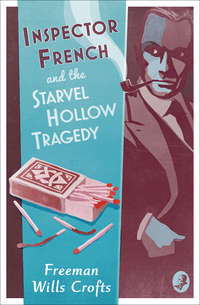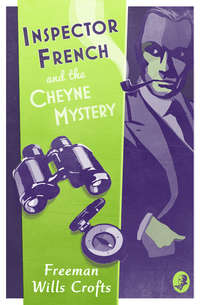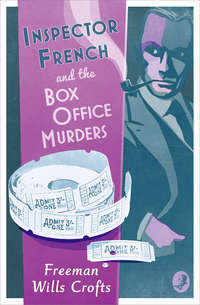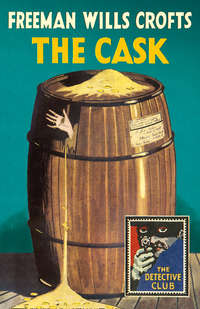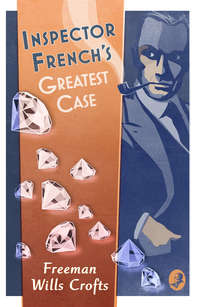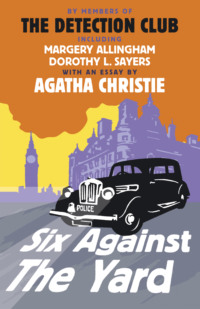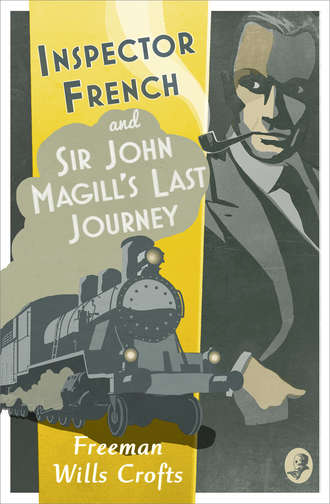
Полная версия
Inspector French: Sir John Magill’s Last Journey
With the change in the superintendent’s manner French also became more official.
‘If you ask me, sir, I think we should concentrate on finding the body.’
Rainey jerked himself round in his seat.
‘There’s not much doubt about that,’ he agreed. ‘Certainly we should find the body. There’s nothing we’d all like so much as to find the body. But how do you suggest we should do it?’
French also moved uneasily.
‘Well, sir, of course that’s the trouble. I’ve been trying putting myself in the murderer’s place. There he was with the body; fatal evidence which he’d got to get rid of. Now it seems to me that one of two things must have been done. Either the body must have been put into the sea or it must have been buried. And on the face of it the latter is the more likely.’
Rainey looked up sharply.
‘Why do you say that?’ he asked.
‘Only from my general experience,’ French answered. ‘I’ve had a number of cases in which bodies were got rid of in the sea and I’ve never known one successful. The bodies were always washed ashore or seen from a ship or hooked by a fisherman or got hold of in some other way. Of course I know this is not conclusive.’
‘No, it’s not conclusive,’ Rainey agreed, ‘but it’s my own opinion also and I’ve already gone into it. As it happens it’s supported by a further consideration, not conclusive either, but still carrying a certain weight It is this. There are only two places where such a scheme might be attempted. There is the sea on the Belfast Lough side of Islandmagee, that is here’—he pointed to the map—‘and there is the sea along the Coast Road beyond Larne. These two places are on the open sea, for I think we may dismiss Lough Larne from our consideration—no one would be mad enough to try to hide a body in that shallow, land-locked area. Now take these others in turn. With regard to the coast near Whitehead there is nowhere, except in Whitehead town itself, where you could get a car, especially a Rolls-Royce, anywhere near the actual shore. To get the body down would involve carrying it a long way. Further, most of the paths lead past houses and nearly all these houses have watchdogs. Now we have made inquiries, and no dogs were heard to bark that night. So the chances are against Whitehead.’
French nodded without speaking.
‘Now with regard to the Coast Road shore,’ Rainey went on. ‘Here the actual difficulties would be less—the road runs beside the beach and is lonely and deserted. But here with a flowing tide a strong current sets along the coast which would tend to wash the body into the path of shipping approaching Belfast. If Malcolm knew that, and he can scarcely have failed to do so, he would think twice before running such a risk. So that, quite tentatively, your second theory, burial, looks the more likely.’
‘That’s just the way I should put it, sir,’ said French. ‘Well then, it seems to me a matter of eliminating unlikely places and searching the remainder for signs of digging.’
Rainey smiled ruefully.
‘Some job, Inspector,’ he protested.
‘I don’t think it would be such a very big job,’ French returned. ‘From what the sergeant here tells me, I should say that the areas that need be considered are very small indeed. There are no old mines or disused quarries or uncultivated lands in the neighbourhood. In fact, sir, I was going to suggest that somewhere about the major’s own estate would be the most likely. The sergeant said it was sheltered by a wood. Where else could he guarantee the necessary privacy?’
Rainey paused.
‘It’s an idea and you may be right,’ he said dubiously. ‘M’Clung, you have been out at the place. What do you think of the inspector’s idea?’
M’Clung moved uneasily.
‘It might be right enough, sir,’ he answered without enthusiasm. ‘There’s certainly a planting between the Coast Road and the avenue that wouldn’t likely be disturbed. You couldn’t tell what might have been done there.’
‘We’ll have a look at it,’ Rainey decided. ‘Now, Inspector, that’s your theory, and very good it seems as far as it goes. But it does not go far enough. Sir John’s coming to Ireland, his going first to Sandy Row, then to the Cave Hill and then to Whitehead, all seem to me to require some agent besides Malcolm. In short, I don’t see how Malcolm could have arranged these.’
French admitted that no more could he.
‘Very well,’ Rainey went on, ‘that brings us back to my original theory—that the full solution is to be found in London.’
French shook his head. He did not see what more could be learned in London. He was very willing to go back and try again, but he had little hope of the result.
‘I think you’ll have to try,’ Rainey insisted, ‘but wait till we see what this search of Lurigan produces. You might go down there with M’Clung and have a look round. To work properly in London you should know all that’s known here. Of course call in and see me before you go.’
‘We’ll have a bite of lunch, Mr French,’ M’Clung suggested as they left the room, ‘and then get away on down.’
But the start was destined to be delayed. On returning to headquarters for the necessary search warrant they were told that Superintendent Rainey had that moment telephoned that they were to be stopped and sent in to him. They found him leaning back in his chair with a letter in his hand, at which he gazed with an expression of the keenest interest. He glanced up as they entered.
‘Sit down again,’ he directed. ‘Here’s something that’ll surprise you. Look at this.’
5
Lurigan
Superintendent Rainey passed over a short, typewritten letter. The paper was of medium quality, a sheet torn off one of those multitudinous blocks or pads which are sold in every stationer’s, and which unless through some accident, are so impossible to trace. The typing suggested that the writer was a novice in the art, there being seven mistakes in the lettering and three in the spacing. With some satisfaction French saw that the machine used had worn type. There should be no difficulty in identifying it, were he only lucky enough to come across it. The letter read:
‘Belfast, 7th October.
‘The Chief of Police, Belfast.
‘SIR,—In view of certain rumours which, as you know, are current, I feel it my duty to inform you of the following facts:
‘While driving alone in my car along the Coast Road towards Larne at about 2.30 on the morning of Friday, 4th inst., I felt cramped from long sitting and decided to stop for a moment to stretch my legs. I did so just after passing Ballygalley Head and close to the gates of Lurigan, Major Magill’s residence. Among the trees of the small plantation between the road and the avenue I saw that some operations were in process. At least one figure was moving about and there were occasional gleams of a light. I do not know who was there or what he was doing, nor did I go to investigate.
‘This fact may have no significance—I trust it has not. But for the reason mentioned I think it my duty to report it to you. I do not wish to be brought into the affair, and as I can see that—whether there is anything wrong or not—my evidence is not essential, I am suppressing my name and address.
‘Yours, etc.,
‘X.Y.Z.’
French gave vent to a low whistle as he read this communication.
‘Bless my soul!’ he said, ‘that’s a bit of a coincidence, that is! Here were we talking about possible operations on that night at Lurigan, namely, the burial of Sir John Magill’s body, and here not an hour later comes in a letter to say that such operations were actually seen! Here, Sergeant,’ he went on, obeying a gesture from Rainey, ‘have a look over that. I suppose, sir,’ he turned back to the superintendent, ‘it’s not likely to be a hoax?’
‘A hoax? I should say it is, extremely likely. But we’ll take it seriously for all that. I always do so in such cases as a matter of principle.’
‘So do we, sir. And many a vital hint we’ve got in just such a way. Two-thirty a.m.!’ He paused, then added:
‘What’s to prevent Malcolm committing the murder, arriving home at eleven-thirty, as he says, garaging the car with the body inside, and when his wife was asleep stealing out of the house, getting the body out of the car, and burying it?’
‘Sounds all right, Inspector,’ Rainey agreed. ‘That’ll be something more for you to look into when you’re down there this afternoon.’
‘We’ll certainly look into it. I suppose, sir,’ French went on, ‘we couldn’t get anything from the letter? The paper is ordinary, but the typewriter’s old and distinctive.’
‘Not much good, that, to find our man,’ Rainey returned. ‘Useful to identify him if we had him, of course.’
‘What about finger prints?’
‘I’ll have the paper tested, but the same remarks apply.’
‘The envelope?’
Rainey tossed it across.
‘No help there either, I’m afraid. You see, it’s simply addressed with the same machine to “The Chief of Police, Belfast.” I’ll try the inside of the flap for prints, but there’s not much chance of getting any.’
There was a pause, then Rainey continued: ‘Well, is that all? If so, I think you and M’Clung should get away. I’ll see you when you get back.’
The day was one of the finest French remembered for the time of year, as he and the sergeant set off in a police car for Larne. The road led along the shore of Belfast Lough, with high above them on the left the dominating outline of the Cave Hill. ‘There,’ said M’Clung, pointing to a couple of black dots at the bottom of the precipitous cliffs near the summit, ‘are the caves it gets its name from. They say they’re prehistoric dwellings, but I don’t suppose anyone knows that for sure.’ Some nine miles out came Carrickfergus with the fragments of its old walls and its splendidly preserved church and castle, built, tradition has it, when the second Henry sat on the English throne. Then on again, rising to a high windy cutting in the rock, aptly called the Blow Hole, where they called a momentary halt to see the view. From the shore far below them Belfast Lough stretched away to the city itself, with the range of the Antrim hills dominating it to the west and the County Down coast and its islands and lighthouse opposite. To the north were Lough Larne and Islandmagee, while farther east the Scotch coast showed dimly with, very faint and spectral in the far distance, the rocky cone of Ailsa Craig. M’Clung swung down into Whitehead and pointed out the telephone booth at the station, then returning to the main road, drew up at the place at which the hat had been found. After a look round they ran on through the picturesque country to Larne and out along the Coast Road.
About four miles beyond Larne, a few hundred yards before the turn round Ballygelley Head, lay Lurigan, the only house in sight. From the road, indeed only the chimneys were visible, for it stood back: on a little plateau some fifty or sixty feet above the sea. M’Clung parked the car and they got out and looked about them.
Curiously enough, the point at which they had stopped formed the junction between two varieties of scenery. In front all was bleak and rugged. To the left was the series of cliffs which terminated in Ballygallay Head, not very high, but rocky and precipitous and strikingly massed, with the road at its base and the sea at the further edge of the road. All harsh and forbidding, without trees, and softened only by patches of rough grass clinging here and there on the stone. But the view looking back towards Larne might have been in another country. Here in the foreground the rocky cliffs gave place to grass slopes, which a little further along were covered by a thick matting of alders. These softer outlines ran back in a wide sweep to the headlands at Larne, with the spiky memorial tower showing in the gap at the mouth of the harbour. Beyond, the line of Islandmagee continued on, with Muck Island looking as if some giant had chopped a bit off the end of the promontary.
The sea was a gorgeous blue right out to the horizon. Straight opposite, some five or six miles out, were the islands and lighthouses of the Maidens. Behind them, faintly in the distance, was Ailsa Craig, with far away on the left the hummock of Kintyre and on the right, to balance the picture, the long line of the Wigtownshire coast. Everywhere were birds, mostly gulls, poised or slowly wheeling on their graceful wings and uttering mournful cries as they went about their lawful occasions.
But interesting, and delightful as were these sights, it was not upon them that French concentrated. The car had stopped at a quarry near a slight bend of the road, and not a hundred yards behind them was the Lurigan entrance. The drive, facing towards Ballygalley, swung round quickly through nearly two right angles and ascended the grassy slopes until it dived into a thicket of alders. There it turned inland, leaving a wide belt of trees between it and the road. To this belt M’Clung pointed.
‘There’s what we want, Mr French,’ he declared. ‘That’ll be where our friend X.Y.Z. saw the moving light.’
There could be no doubt on the matter. The plantation was the only part of the Lurigan estate which could be overlooked from the road. If X.Y.Z. were telling the truth it was among these trees that they might expect to make their find.
Having noted the area inside which they must search, the two men climbed to the wood and began walking backwards and forwards, examining every inch of the surface. Here and there there were stunted firs and beneath them the ground was more or less clear, but the alders made a dense undergrowth. Search through these thickets was slow, but the men worked steadily on, not passing a single foot until they were sure the ground had not been disturbed. And then as they had reached the centre of the little wood, French’s nerves gave a thrill and he came to a sudden stop. Yes, X.Y.Z. had not misled them nor had their deductions been faulty! Here was what they had been looking for.
Screened by alders before and behind was a clump of branches which at once attracted French’s attention, for their leaves were drooping and they stood at awkward and unnatural angles. He gave one a sharp tug. As he expected, it came up without difficulty and proved to have no roots. Softly he called to M’Clung and the two men began to clear away the clump. The branches covered a freshly sodded mound some six feet long by two feet wide. Moreover on all the surrounding ground were traces of yellow clay!
‘Boys, Mr French!’ whispered M’Clung, his excitement causing him to revert to the speech of his fathers. ‘Did ever you see the like o’ that? It’s a grave!’
‘It’s a grave sure enough,’ French agreed, ‘and if it was made on that Friday morning as X.Y.Z.’s story suggests, it’s not hard to imagine whose body’s in it.’
M’Clung shook his head.
‘It looks like the major,’ he declared. ‘It’s hard to see who else could have done it.’
‘We’ll consider that later,’ said French, glancing at his watch. ‘It’s now after five o’clock and it’ll be dark in no time. Suppose you run back to Larne and ring up your chief and arrange with him about opening this up. I’ll stay here till you come back. I’m sure Superintendent Rainey will agree that Major Magill should be present at the opening. And if you ask me, mum’s the word. This should be sprung on the major.’
When M’Clung had gone French began slowly to pace to and fro. Certainly he agreed with the sergeant, this discovery did look bad for Major Magill. So far as he could see, no one but the major could have carried out the crime. No one else had the opportunity and the means. If the body of Sir John Magill lay here in this lonely plantation, it could only have been brought from Whitehead in a car, and who beside the major had on that night at once the necessary car, the motive and the knowledge?
In about an hour M’Clung returned and with him two constables from the Larne barracks. French joined them on the road.
‘I rang up the superintendent,’ said M’Clung. ‘He says we can’t open this up without an order from the Ministry of Home Affairs and he’ll get one tomorrow. He’ll come down first thing the day after. Meantime, Mr French, we’re to clear out now and these two men will watch the place.’
‘Right, Sergeant. What do we do then? Go back to Belfast?’
‘A matter for yourself, sir. You’d likely be more comfortable in Belfast, but if you stay over in Larne it will save you an early start. The superintendent is starting at six-thirty to get the major in before he leaves for town.’
‘You’re going back, are you?’
‘I am, sir.’
‘Then I’ll go too.’
At thirty-three minutes past six two mornings later a large car left the city. In it were French, Rainey, M’Clung, two constables and Dr Finley, the police doctor. They retraced the road along which French had driven a couple of days earlier. The morning was exquisitely fresh and the colouring warm and vivid in the light of the rising sun. At a good speed they ran to Carrickfergus, then after a slack through the town, they pressed on again, until in just an hour and four minutes after starting they pulled up outside the gates of Lurigan.
For some minutes Rainey moved about, examining the grave and the lie of the surrounding land. Then with French he walked to the door and knocked.
‘Is Major Magill about yet?’ he asked the somewhat surprised-looking servant.
‘He’s in at breakfast, sir.’
‘Then give him my card and say that I should like to see him as soon as he has finished.’
They were shown into a drawing room on the right of the hall, from the bow window of which there was a fine view out over the sea. But they had not long to enjoy it. A thin, dark energetic looking man soon bustled into the room.
‘Good morning, Superintendent,’ he said doubtfully, holding out his hand. ‘Nothing wrong, I hope?’
‘Let me introduce Detective-Inspector French of the C.I.D.,’ said Rainey gravely. ‘We want to see you, Major Magill, on rather serious business, but we can wait till you’ve finished your meal.’
Malcolm Magill’s face changed.
‘What?’ he exclaimed. ‘Is there any news? Anything about my father?’
‘There is some news,’ Rainey returned, ‘but, as I say, we can wait till you’ve breakfasted.’
‘Let’s get on right ahead with it now,’ said Malcolm briskly. ‘I was just finishing and I’ve had all I want. Will you smoke?’ He held out a gold cigarette case.
‘No, sir, thank you. We want you, if you’ll be good enough, to come out with us.’
‘Good Lord, but you’re darned mysterious,’ said Malcolm with a smile, though there was no laughter in his eyes. ‘Is it close by?’
‘Not five minutes away.’
As they left the house the Superintendent said in formal tones: ‘I have to tell you, Major Magill, that acting on information received, a search was made two days ago on this property.’ As he spoke his watch on the other was very keen. ‘A discovery was made, a very suggestive discovery, which may or may not prove important. Investigation of it was put off until this morning in order to have the benefit of your presence. This is the explanation of this early call. Here is the warrant under which we are acting.’
French, also watching keenly, saw the bewilderment in the major’s eyes change subtly to apprehension.
‘As I said, you’re darned mysterious,’ he repeated, but there was less assurance in his tone. ‘What is the nature of this discovery?’
‘You will see in a moment.’
By this time they had reached the point at which it was necessary to turn aside from the drive into the plantation. A moment more and they passed through the screen of trees and came in sight of the grave.
French found himself wondering whether anyone could show such signs of amazement as Major Magill did without really feeling it. Either the man did not know the grave was there or he was one of the best actors French had met. In somewhat shaky tones he gave vent to an oath and demanded of the superintendent what this thing meant.
‘That’s what we’re here to find out,’ Rainey answered. ‘We wondered if you would care to make any statement about it. You needn’t, of course, unless you like.’
‘Statement?’ Magill cried. ‘I? Good heavens, Superintendent, you don’t imagine I know anything about it, do you? I can assure you the thing’s an absolute mystery to me. What it means or who made it I haven’t the slightest idea!’
‘I’m glad to hear you say so,’ said Rainey. ‘The suggestion made is that this is a grave and it looks like a grave, so we’re going to open it. It was necessary for you to be present while we did so.’
The hint underlying the superindentent’s words was not lost on Malcolm Magill. He paled somewhat and was evidently acutely uneasy. Both French and Rainey continued to watch him keenly. Two or three times he made as if to speak, but finally relapsed into silence, while a troubled look settled down on his features.
Конец ознакомительного фрагмента.
Текст предоставлен ООО «ЛитРес».
Прочитайте эту книгу целиком, купив полную легальную версию на ЛитРес.
Безопасно оплатить книгу можно банковской картой Visa, MasterCard, Maestro, со счета мобильного телефона, с платежного терминала, в салоне МТС или Связной, через PayPal, WebMoney, Яндекс.Деньги, QIWI Кошелек, бонусными картами или другим удобным Вам способом.


